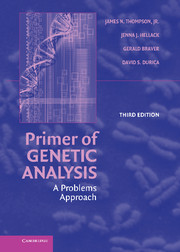Book contents
- Frontmatter
- Contents
- Preface
- Note on Genetic Symbols
- 1 Overview of Genetic Organization and Scale
- 2 Mitosis and Meiosis
- 3 Nucleic Acids: DNA and RNA
- 4 Basic Mendelian Genetics
- 5 Probability and Chi-Square
- 6 Sex-Linkage and Gene Interactions
- 7 Pedigree Analysis
- 8 Overview of Basic Statistical Testing
- 9 Quantitative Inheritance
- 10 Overview of Genetic Mapping
- 11 Assessing Chromosome Linkage Relationships
- 12 Linkage and Mapping in Diploids
- 13 Mapping in Bacteria and Viruses
- 14 Overview of Types of Genetic Change
- 15 Gene Mutation
- 16 Changes in Chromosome Number and Structure
- 17 Protein Synthesis and the Genetic Code
- 18 Gene Regulation and Development
- 19 Overview of Molecular Biology Techniques
- 20 DNA Mapping and Human Genome Analysis
- 21 Basic Population Genetics
- 22 Selection and Evolution
- 23 Practice Tests
- 24 Answers to Practice Tests and Crossword Puzzles
- 25 Landmarks in the History of Genetics
- Glossary
- Reference Tables
25 - Landmarks in the History of Genetics
Published online by Cambridge University Press: 05 June 2012
- Frontmatter
- Contents
- Preface
- Note on Genetic Symbols
- 1 Overview of Genetic Organization and Scale
- 2 Mitosis and Meiosis
- 3 Nucleic Acids: DNA and RNA
- 4 Basic Mendelian Genetics
- 5 Probability and Chi-Square
- 6 Sex-Linkage and Gene Interactions
- 7 Pedigree Analysis
- 8 Overview of Basic Statistical Testing
- 9 Quantitative Inheritance
- 10 Overview of Genetic Mapping
- 11 Assessing Chromosome Linkage Relationships
- 12 Linkage and Mapping in Diploids
- 13 Mapping in Bacteria and Viruses
- 14 Overview of Types of Genetic Change
- 15 Gene Mutation
- 16 Changes in Chromosome Number and Structure
- 17 Protein Synthesis and the Genetic Code
- 18 Gene Regulation and Development
- 19 Overview of Molecular Biology Techniques
- 20 DNA Mapping and Human Genome Analysis
- 21 Basic Population Genetics
- 22 Selection and Evolution
- 23 Practice Tests
- 24 Answers to Practice Tests and Crossword Puzzles
- 25 Landmarks in the History of Genetics
- Glossary
- Reference Tables
Summary
The science of genetics has been the recipient of information from many unrelated fields of science as well as those closely related, such as cytology and evolutionary biology. Genetics, cytology, and evolutionary biology are endeavors that tend to link biochemistry, geology, all of biology, and many other sciences in an all-encompassing theory of life on this earth. Correspondingly, change in our knowledge in any of these areas advances our knowledge in the others. Thus, it is quite hard to create a chronological list of the historic events that have had an impact on genetics. Even an attempt to describe the most important or most directly associated events is difficult. This list is not meant to be inclusive. The chronology in A Dictionary of Genetics by R. C. King, W. D. Stansfield, and P. K. Mulligan (New York: Oxford University Press, 2006) is an excellent source of information. We have drawn some of our ideas from their much more comprehensive historical presentation. Our list is not extensive for the last few years. This is not because of a lack of important research, but rather an inability to step back and observe from a distance the numerous events as they unfold. The history of genetics continues to be written at a dazzling pace.
The formal rules of genetic transmission and knowledge of DNA and gene action are fairly modern advances. Yet several examples indicate that an appreciation of inheritance has a long history.
- Type
- Chapter
- Information
- Primer of Genetic AnalysisA Problems Approach, pp. 271 - 282Publisher: Cambridge University PressPrint publication year: 2007



